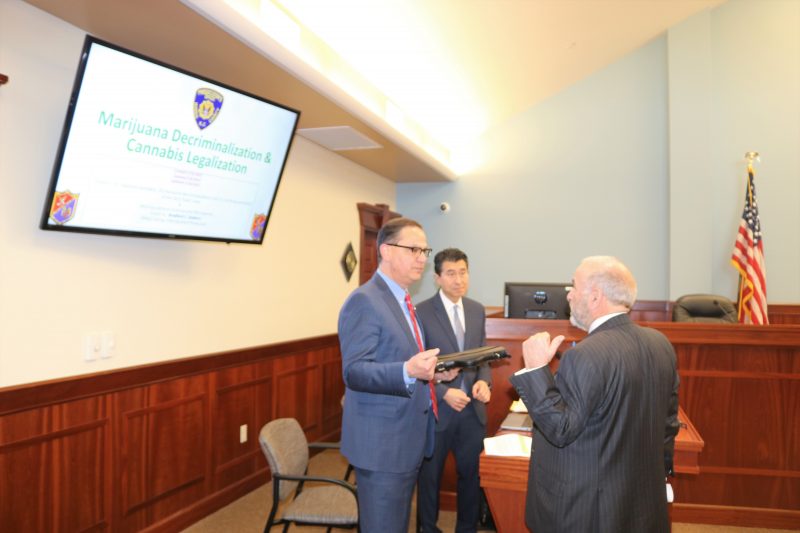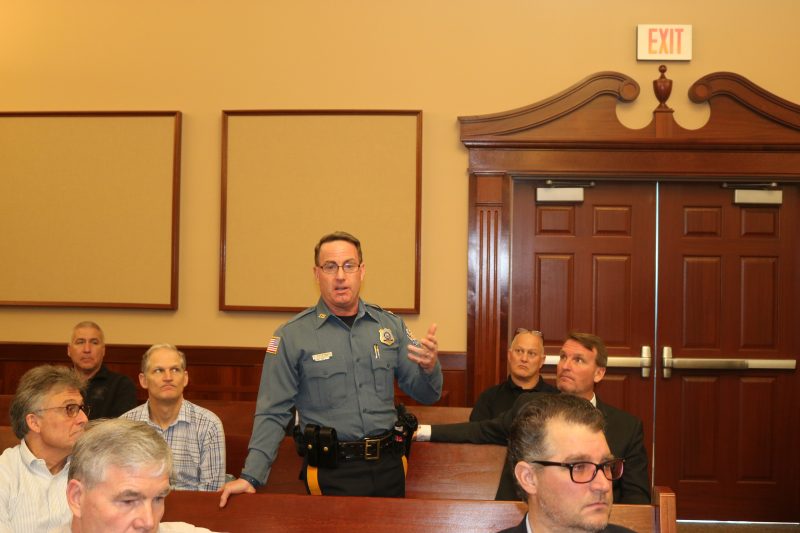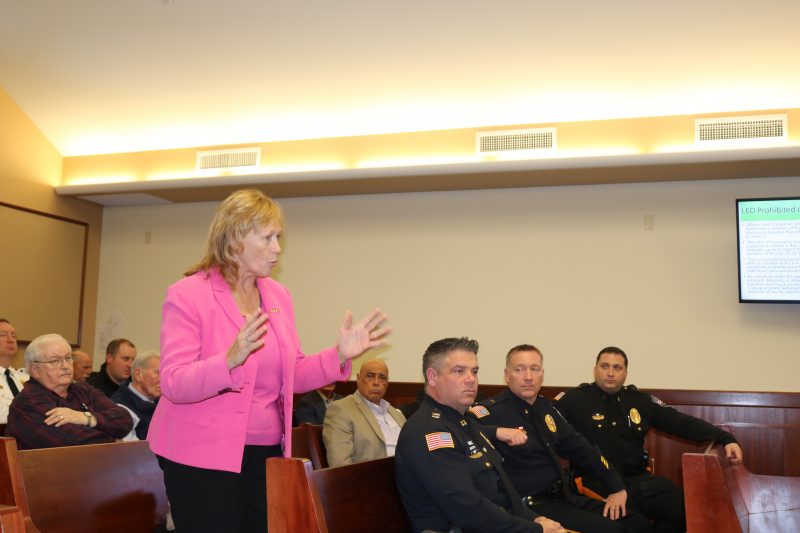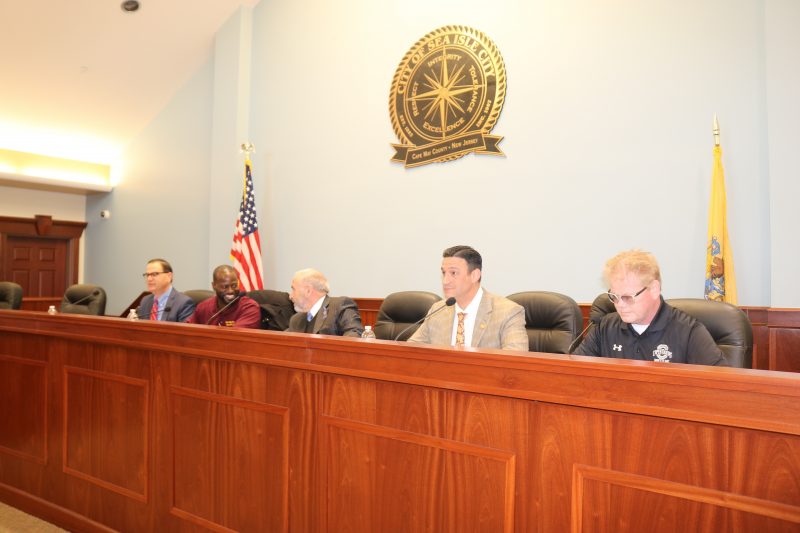Sea Isle City Mayor Leonard Desiderio, right, speaks with Cape May County Prosecutor Jeffrey Sutherland and Assistant Prosecutor Edward Shin during the summit.
 By DONALD WITTKOWSKI
Groups of rowdy teenagers turned parts of the Jersey Shore last summer into their own personal playground for bad behavior.
Outbursts of foul language, underage drinking, vandalism and theft by juveniles disrupted shore towns during the bustling summer tourism season – and in some cases, police were virtually powerless to stop it.
“As you know, in the past year or so we’ve all had some issues with juveniles,” Sea Isle City Mayor Leonard Desiderio told a roomful of state lawmakers, local officials, police chiefs and prosecutors Friday during a summit he hosted to discuss the troublesome teens.
Hoping to avoid a replay of last summer, Cape May County representatives and state lawmakers are considering a series of preemptive measures ranging from new local ordinances to new state legislation to curb unruly behavior.
Cape May County Prosecutor Jeffrey Sutherland said he and other county prosecutors will work with Gov. Phil Murphy’s newly nominated New Jersey Attorney General Matt Platkin on ways to give police more authority to deal with underage drinking and other juvenile offenses.
“Basically, we have prom night all summer long. We have kids coming from different communities and partying,” Sutherland said of the rowdy teens disturbing the shore towns in 2021.
In opening remarks at the 90-minute summit in Sea Isle, Desiderio said police have been severely limited in their enforcement powers by new laws that have “swung the pendulum” the other way in favor of unruly juveniles.
“We need some type of tools to at least bring the pendulum back down to the center and give police some help,” said Desiderio, who is also a Cape May County commissioner.
Desiderio and other officials drew a link between problems caused by underage drinking and New Jersey’s legalization of recreational marijuana for adults. The marijuana laws approved in 2021 include restrictions that prevent police officers from detaining juveniles for possession of cannabis and alcohol.
By DONALD WITTKOWSKI
Groups of rowdy teenagers turned parts of the Jersey Shore last summer into their own personal playground for bad behavior.
Outbursts of foul language, underage drinking, vandalism and theft by juveniles disrupted shore towns during the bustling summer tourism season – and in some cases, police were virtually powerless to stop it.
“As you know, in the past year or so we’ve all had some issues with juveniles,” Sea Isle City Mayor Leonard Desiderio told a roomful of state lawmakers, local officials, police chiefs and prosecutors Friday during a summit he hosted to discuss the troublesome teens.
Hoping to avoid a replay of last summer, Cape May County representatives and state lawmakers are considering a series of preemptive measures ranging from new local ordinances to new state legislation to curb unruly behavior.
Cape May County Prosecutor Jeffrey Sutherland said he and other county prosecutors will work with Gov. Phil Murphy’s newly nominated New Jersey Attorney General Matt Platkin on ways to give police more authority to deal with underage drinking and other juvenile offenses.
“Basically, we have prom night all summer long. We have kids coming from different communities and partying,” Sutherland said of the rowdy teens disturbing the shore towns in 2021.
In opening remarks at the 90-minute summit in Sea Isle, Desiderio said police have been severely limited in their enforcement powers by new laws that have “swung the pendulum” the other way in favor of unruly juveniles.
“We need some type of tools to at least bring the pendulum back down to the center and give police some help,” said Desiderio, who is also a Cape May County commissioner.
Desiderio and other officials drew a link between problems caused by underage drinking and New Jersey’s legalization of recreational marijuana for adults. The marijuana laws approved in 2021 include restrictions that prevent police officers from detaining juveniles for possession of cannabis and alcohol.

 Cape May County Commissioner E. Marie Hayes wants to see more respect for police officers.
Moreover, the directive restricts police in how far they can go to investigate juveniles. It puts police at risk of being charged with a third-degree crime for depriving juveniles of their civil rights if they are searched without sufficient cause.
“This was knee-jerk, feel-good legislation that we’re now sitting in a room trying to clean up. To see kids putting up (videos) on TikTok making fun of police officers makes me sick,” said Cape May County Commissioner E. Marie Hayes, a retired captain in the Cape May County Prosecutor’s Office.
Avalon Mayor Martin Pagliughi called it the “most asinine (legislation) we’ve ever seen in the state of New Jersey.” He, too, is frustrated with how it hinders police in their response to teenage rowdiness.
Sen. Michael Testa and Assemblymen Antwan McClellan and Erik Simonsen, the Republican lawmakers who represent the Cape May County shore towns in the First Legislative District, told the summit they are trying to get new legislation approved to give police more enforcement power to deal with unruly juveniles.
“It all boils down to poor legislation, and we need to fix it,” Simonsen said of efforts to amend the existing laws.
Testa said it amounted to offering “cleanup legislation for the mistakes made under that gold dome” of the Democratic-controlled Statehouse.
Testa has sponsored legislation to protect police from criminal liability complaints that put them at risk of being arrested when dealing with juveniles. His bill has not garnered support among Democrats in the majority.
McClellan said lawmakers, local officials, police and prosecutors must work collaboratively to push through new legislation.
“You guys need our help, but we’re going to need your help as well,” McClellan told the approximately 50 officials attending the summit.
Simonsen said the restrictions placed on police have essentially erased the “whole respect factor” that juveniles should have for law enforcement.
“Last summer was a debacle down here,” Simonsen said of the rowdy teenage behavior.
Cape May County Commissioner E. Marie Hayes wants to see more respect for police officers.
Moreover, the directive restricts police in how far they can go to investigate juveniles. It puts police at risk of being charged with a third-degree crime for depriving juveniles of their civil rights if they are searched without sufficient cause.
“This was knee-jerk, feel-good legislation that we’re now sitting in a room trying to clean up. To see kids putting up (videos) on TikTok making fun of police officers makes me sick,” said Cape May County Commissioner E. Marie Hayes, a retired captain in the Cape May County Prosecutor’s Office.
Avalon Mayor Martin Pagliughi called it the “most asinine (legislation) we’ve ever seen in the state of New Jersey.” He, too, is frustrated with how it hinders police in their response to teenage rowdiness.
Sen. Michael Testa and Assemblymen Antwan McClellan and Erik Simonsen, the Republican lawmakers who represent the Cape May County shore towns in the First Legislative District, told the summit they are trying to get new legislation approved to give police more enforcement power to deal with unruly juveniles.
“It all boils down to poor legislation, and we need to fix it,” Simonsen said of efforts to amend the existing laws.
Testa said it amounted to offering “cleanup legislation for the mistakes made under that gold dome” of the Democratic-controlled Statehouse.
Testa has sponsored legislation to protect police from criminal liability complaints that put them at risk of being arrested when dealing with juveniles. His bill has not garnered support among Democrats in the majority.
McClellan said lawmakers, local officials, police and prosecutors must work collaboratively to push through new legislation.
“You guys need our help, but we’re going to need your help as well,” McClellan told the approximately 50 officials attending the summit.
Simonsen said the restrictions placed on police have essentially erased the “whole respect factor” that juveniles should have for law enforcement.
“Last summer was a debacle down here,” Simonsen said of the rowdy teenage behavior.
 Speakers at the summit include, from left, Cape May County Prosecutor Jeffrey Sutherland, Assemblyman Antwan McClellan, Sea Isle City Mayor Leonard Desiderio, Sen. Michael Testa and Assemblyman Erik Simonsen.
Ocean City Mayor Jay Gillian said police are unfairly being put through “this ordeal” that makes them fearful of losing their jobs. He said the fact that they may face criminal liability when they come in contact with juveniles has made it even harder to recruit new officers.
“It’s getting tougher and tougher to get police officers,” Gillian said.
Local officials repeatedly emphasized that they don’t want to be heavy-handed with teenagers or see them saddled with criminal records. They indicated they would prefer to see some teeth put into the laws to allow police to take juveniles into custody at the station and then call their parents. In law enforcement parlance, it’s called a “stationhouse adjustment.”
“We’re not here to punish them or give them a record. We’re here to enforce (the laws) and improve the quality of life,” Desiderio said.
Rowdy teens were a widespread problem in communities along the Jersey Shore last summer. Shore towns experimented with a variety of ways to prevent juveniles and young adults from getting out of hand.
Sea Isle increased its police patrols along the beaches, Promenade and downtown business district. It also closed off the pathways to the beaches at 10 p.m. to prevent large groups of juveniles from congregating on the beaches
Mayor Pagliughi signed an executive order to close Avalon’s beaches and Boardwalk at night because large groups of teens were wreaking havoc, including vandalizing cars, homes and public restrooms.
Ocean City had an outbreak of unruly teenagers riding their bikes in the middle of streets and disrupting traffic. Police responded by giving the teens warnings.
Large groups of juveniles also gathered on Ocean City’s beaches and Boardwalk last summer. Ocean City’s beaches normally close at 10 p.m. Prettyman explained that the city decided to extend it to 11 p.m. to deliberately keep the teens on the beaches longer so they wouldn’t cause trouble in other parts of town.
“We decided to keep them on the beach for an extra hour, and it worked,” Prettyman told the summit. “The theory was that they can’t break anything on the beach; they can’t burn it down.”
Speakers at the summit include, from left, Cape May County Prosecutor Jeffrey Sutherland, Assemblyman Antwan McClellan, Sea Isle City Mayor Leonard Desiderio, Sen. Michael Testa and Assemblyman Erik Simonsen.
Ocean City Mayor Jay Gillian said police are unfairly being put through “this ordeal” that makes them fearful of losing their jobs. He said the fact that they may face criminal liability when they come in contact with juveniles has made it even harder to recruit new officers.
“It’s getting tougher and tougher to get police officers,” Gillian said.
Local officials repeatedly emphasized that they don’t want to be heavy-handed with teenagers or see them saddled with criminal records. They indicated they would prefer to see some teeth put into the laws to allow police to take juveniles into custody at the station and then call their parents. In law enforcement parlance, it’s called a “stationhouse adjustment.”
“We’re not here to punish them or give them a record. We’re here to enforce (the laws) and improve the quality of life,” Desiderio said.
Rowdy teens were a widespread problem in communities along the Jersey Shore last summer. Shore towns experimented with a variety of ways to prevent juveniles and young adults from getting out of hand.
Sea Isle increased its police patrols along the beaches, Promenade and downtown business district. It also closed off the pathways to the beaches at 10 p.m. to prevent large groups of juveniles from congregating on the beaches
Mayor Pagliughi signed an executive order to close Avalon’s beaches and Boardwalk at night because large groups of teens were wreaking havoc, including vandalizing cars, homes and public restrooms.
Ocean City had an outbreak of unruly teenagers riding their bikes in the middle of streets and disrupting traffic. Police responded by giving the teens warnings.
Large groups of juveniles also gathered on Ocean City’s beaches and Boardwalk last summer. Ocean City’s beaches normally close at 10 p.m. Prettyman explained that the city decided to extend it to 11 p.m. to deliberately keep the teens on the beaches longer so they wouldn’t cause trouble in other parts of town.
“We decided to keep them on the beach for an extra hour, and it worked,” Prettyman told the summit. “The theory was that they can’t break anything on the beach; they can’t burn it down.”